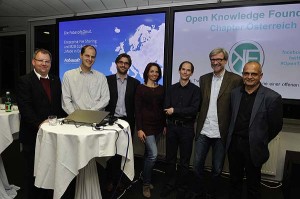About 2 weeks ago, on the 14th of November 2013 an
Open Knowledge Foundation Austria (OKF-AT) MeetUp took place in the late afternoon with the title & topic: Open Transport (Data). The MeetUp was hosted at Fabasoft (one of the bigger Austrian IT vendors) in Vienna, Austria. The idea of this event was to present and discuss the current status of transport information systems in Austria and Open Data / Open Transport as well as to discuss how these sector can become more open and take a look into planned future steps of open transport in Austria.
FOTO: Copyrights: Fabasoft AG; Fotograf: Peter Ehringer
After a short introduction by Helmuth Bronnenmayer (Board Member of OKF-AT) telling the ~ 35 people of the audience about objectives and activities of the Austrian chapter of the Open Knowledge Foundation (see slides:
http://de.slideshare.net/okfo/okf-atmeet-upopentransport20131114) the topic of the MeetUp was introduced by Peter Parycek (Danube University Krems) and Robert Harm (open3) by giving an insight in the area of Open Transport in the MeetUp keynote – see:
http://de.slideshare.net/okfo/okf-atmeet-upopentransportkeynote. Peter introduced the idea of open transport (data) and showcased the importance to open up transport data to (beside others) enable cross-border mobility services and apps. He also introduced the ODP AT – the
Open Data Portal Austria project that develops an open data portal for all data – beside government data – in Austria (science, education, industry, NGO & NPO, citizens, OpenGLAM, et al) that will be launched in May / June 2014.
Following the opening keynote 3 short presentations of the
City of Linz, by Egon Pischinger of Linz AG (provider of public transport in the City of Linz) where
transport data is open but services / applications are still maintained by the City of Linz (although there are already several apps on Linz data in place today), see his slides:
http://de.slideshare.net/okfo/okf-atmeet-upopentransportdatalinz. Big discussion with Egon & the audience were on the issue why the Linz AG thinks that there is still a need to create & maintain transport apps by the data providers (by themselves) and not starts to become a pure data provider. Linz AG argued that they do not see really stable maintaintence of the existing open transport apps for Linz these days.
transport data is also open in the
data catalogue. Rainer explained in a very comprehensive talk the whole landscape of the Austrian transport information- and data system. This mainly consists of A) the
GIP System that is the basic infrastructure of all transport / traffic routes in Austria – a system that for the first time brings together all data of these traffic routes accros the 9 provinces of Austria on a centralised national level and that has to be adapted to the INSPIRE directive as a next step (and thereby could (!) become open data also). And B) the
VAO – Verkerhsauskunft Österreich = Information System on Traffic & Transport in Austria that puts all the additional information on top of the GIP System as traffic flow, schedules of trains, busses & other public transport et al. This data is NOT open data anyhow at the moment as there are several stakeholders involved in this project with different data sets as public administration as well as companies like the Austrian Broadcasting Company or the Austrian Automotive Club et al. The pitty here is that open data is not even a topic of discussion in the VAO project group at the moment – but possibly the MeetUp as well as following meetings & discussions can change this a bit!
A comprehensive Q&A session as well as a networking session with catering & drinks completed the OKF-AT MeetUp on Open Transport (Data). So what about the findings of this event? Lets say the information- and data system of Austria in the field seems to be on a good way to be harmonised accross our 9 provinces and also some Cities already provide open transport data (as geoinformation, traffic routes or timetable information) in their respective data catalogues – BUT: A) there is no discussion how open data can change environmental problems of transport data in Austria, B) there are NO plans on how to open up the data of the Austrian central transport information system and C) there are only little thoughts about how to follow standardisation on European level (beside INSPIRE) to enable cross border services on (open) transport data – so a lot work still in front of us!
 Open Knowledge Open Transport Working Group
Open Knowledge Open Transport Working Group 
Leave a Reply